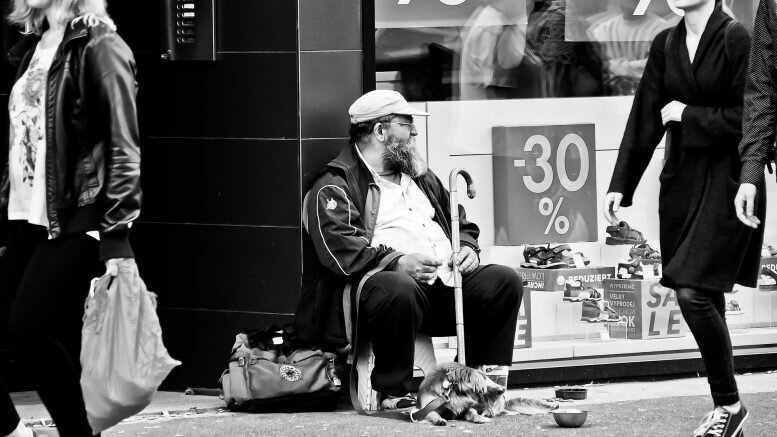More than six out of ten wants ban on begging
Less than one in four (23 percent) say yes to allow begging in a survey of our view on welfare policy. 63 percent are in favour of a ban on begging.
Among the parties in the Parliament (Storting) there are diverging opinions on begging bans. The Government had to seek support from the Centre Party when it two years ago managed to secure a majority for a proposal to allow for local begging bans. A Nation wide prohibition, that the Government parties, the Conservatives and Progress Party wish for, did not achieve a majority vote though.
In a recent survey conducted by Kantar TNS on behalf of Oslo University College and Akershus (HiOA), there is however a clear majority for a National ban on begging. Only a scant one in five say no, while 14 percent does not state an opinion.
Politically evenly distributed
The survey was conducted online, and the over 3,000 who participated, distributed politically approximately in line with what was the average of the polls when the survey was conducted in June. In other words, the voters and parties do not appear to be completely in line with the popular beliefs on whether begging should be banned or not.
A general ban on begging in Norway was discontinued in 2005.
In the wake of the NRK documentary ‘Lykkelandet’ (The Happy Country), Justice Minister Per-Willy Amundsen (Frp) told NRK that he still thinks it should be a National ban but that this must be handled locally as long as there is no majority in the Parliament for a Nation wide prohibition.
Single parents
A majority of those surveyed in the ‘The Welfare Barometer’ additionally point to single parents as the single group in Norway with the greatest need for Governmental assistance.
28 percent believe single parents are the group who is struggling the most financially in Norway today. Almost as many, 26 percent, believe that single parents should be shielded as a group if there is to be cuts in state transfers. Almost half – 46 percent – also believes that single parents are the group with the worst economic development over the past four years.
Regarding the economic development last four years for groups such as immigrants and refugees, families with children and young people, only two out of ten believe it has deteriorated. About an equal share of the respondents believes that these groups have gained financially over the last four years.
Child poverty
Child poverty is one of the topics on the agenda of the political gatherering in Arendal this week, where the welfare barometer is presented on Wednesday.
A clear majority of 41 percent of participants in HiOA’s survey believe that children living in poverty in today’s Norway usually have single providers as parents. 26 percent assume that children in poverty grow up with unemployed parents, while 22 percent assume their parents are immigrants or refugees.
Numbers from Statistics Norway show that 98,000 children grow up in a family with permanent low income. The number of poor children has been growing steadily since the millennium, from 3.3 per cent in 2001 to 10 per cent at present.
In the welfare barometer 34 percent say they do not believe that there have been more poor children in Norway under the Conservatives / Progress Party Government. 29 percent believe the number is unchanged, while 5 percent believe that there have been fewer poor children in Norway in the last four years.
See Also
Welfare Norway fails thousands of children
© NTB Scanpix / Norway Today



